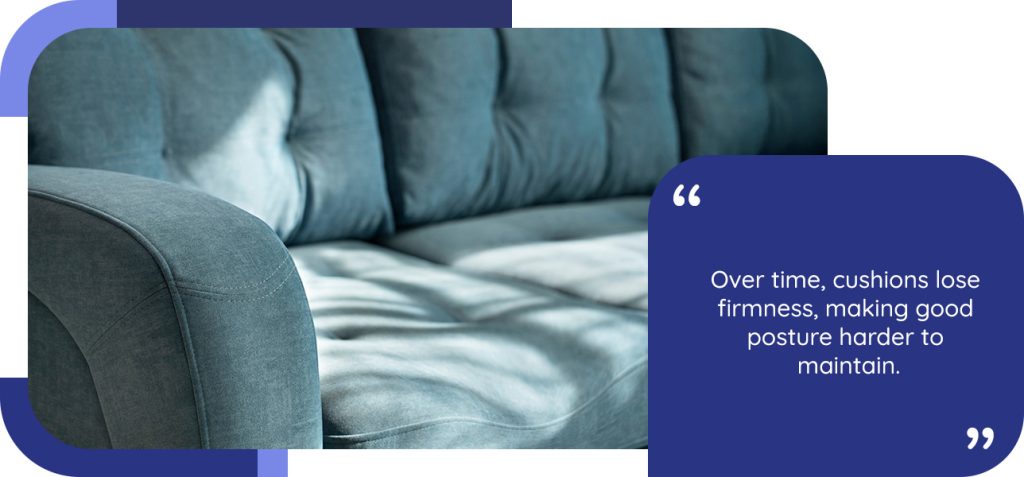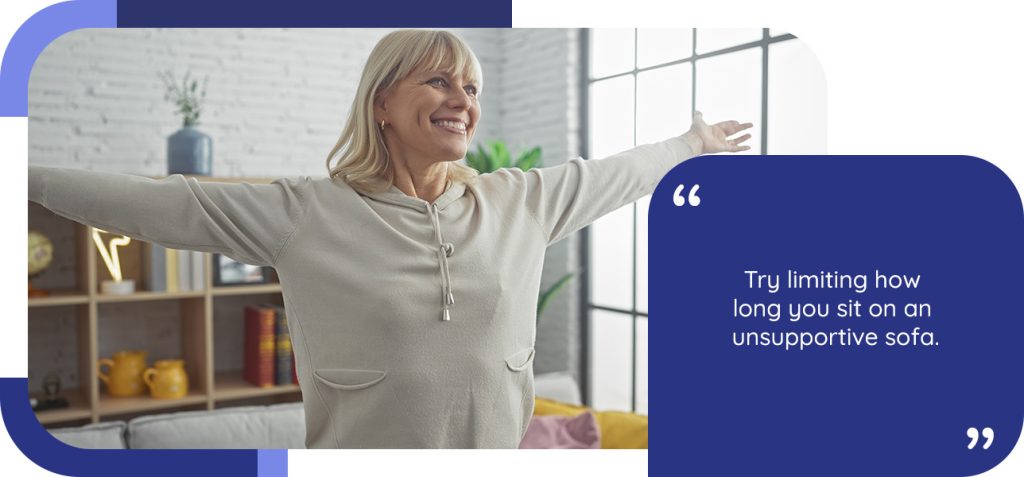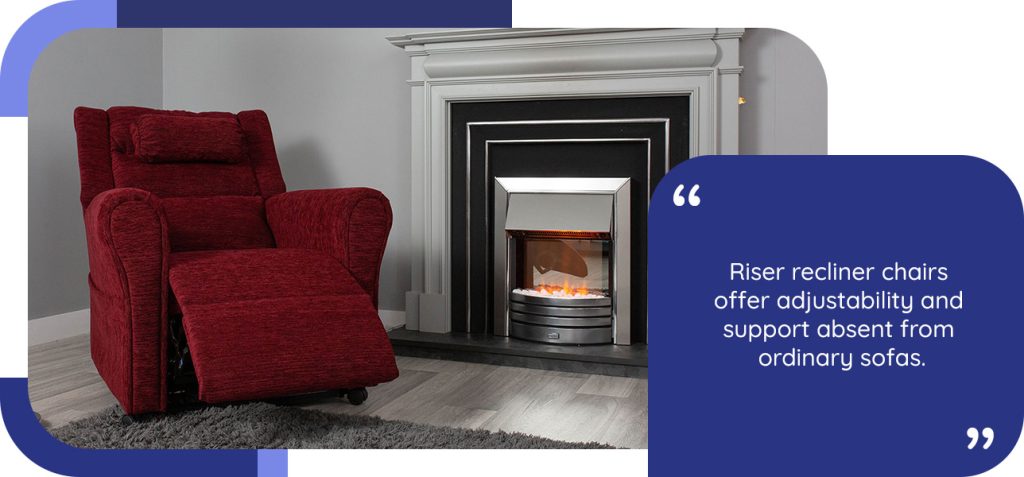Does your sofa hurt your back?

If you love to unwind on a comfortable sofa but often find yourself getting up with a sore back, your couch might be the culprit. Back pain is a widespread issue, with around four in five adults experiencing lower back pain at some point, and our daily habits, including how and where we sit, can be significant contributors.
This guide will explore how sofas can cause back pain, the warning signs to look for, and practical steps you can take for more comfortable seating. You’ll learn tips for better posture, simple fixes for unsupportive sofas, and why considering a riser recliner chair could be a beneficial solution for your spine.
Table of contents
1. Signs your sofa may be causing back pain
Unsure if your couch is contributing to your backache? Here are common indicators:
- Stiffness or soreness after sitting: If relaxing on the sofa for a while leaves you with lower back pain, or if pain
appears when you stand up, your seating position may be straining your spine. - Inability to sit straight: Deep, soft couches often encourage slouching. If you constantly fidget to get comfortable or find yourself slumping, your sofa might lack adequate support.
- Low or saggy cushions: A seat that’s too low can place your knees higher than your hips, tilting your pelvis and rounding your lower back. Over time, cushions lose firmness, making good posture harder to maintain.
- Difficulty standing up: If you strain or need to push off with your arms to rise from your sofa, it may indicate the sofa is too plush, lacks support, or is placing extra load on your back and knees.
- Reported issues by others: A survey found that 20% of people reported back problems after purchasing soft cushioned furniture, highlighting how common this issue is.
If these signs seem familiar, your sofa could be a factor in your back pain.

2. Why soft sofas can hurt your back
Sinking into a plush sofa might feel relaxing initially, but ultra-soft couches can result in a problematic spine posture. When you lounge on a soft surface, your body tends to collapse into a “C”-shaped slouch. Your hips may slide forward, causing your lower back to lose its natural curve and your shoulders to hunch. This posture places excessive pressure on your vertebrae and overstretches the discs, ligaments, and muscles supporting your spine, potentially leading to chronic backaches.
Modern sofas often feature deep seats and plush cushions which, while luxurious, may not provide firm support. This can lead to sitting with your tailbone tucked under and a rounded back, a posture that strains your back over extended periods.
Soft sofas can also encourage habits like sitting with your legs crossed or feet tucked up, twisting your hips and spine into unnatural angles. While these positions might feel comfortable briefly, they can cause awkward bending and lead to stiffness.
Consider the cumulative effect of sitting. Many adults spend several hours a day sedentary, and this often increases with age. If much of this time is spent slouching on an unsupportive sofa, the impact on your back can be significant, contributing to the high prevalence of lower back pain. Essentially, when a sofa doesn’t adequately support your spine, gravity can pull your back into a slouch, gradually straining your lower back structures.
3. How to sit on a sofa to prevent back pain
You don’t necessarily need to avoid your sofa entirely; adopting a healthy sitting posture is key. Here are some expert-backed tips:
- Keep your feet flat on the floor: Avoid dangling your feet. Both feet planted helps stabilise your posture and align your knees and hips.
- Ensure hips and knees are at a 90° angle: Sit with your knees level with or slightly above your hips. If your sofa is very low, a firm cushion can raise your seating height, preventing your lower back from rounding excessively.
- Use the backrest: Scoot your bottom back so your back is against the sofa backrest. If there’s a gap, use a small cushion or rolled towel to support your lower back’s natural curve.
- Sit upright with relaxed shoulders: Aim for a neutral spine, with your ears over your shoulders and shoulders over your hips. Leaning against the backrest with a neutral spine is supportive. Avoid slouching or craning your neck.
- Avoid crossing your legs: Keep thighs parallel and uncrossed. Crossing legs or tucking them up twists your lower body and can unevenly load your back.
- Take regular breaks: Stand up or walk briefly every 30 minutes to relieve pressure on your spine. Gentle stretches can help if stiffness occurs.
Implementing these tips can make a significant difference. Medical experts advise using seating that supports your back’s natural curve. If your sofa is too soft, a lumbar cushion can mimic this firm support.
Quick tip: If you like to elevate your feet, use a separate footstool or ottoman. This allows you to raise your legs without contorting your body, reducing pressure on your lower back while keeping your spine straight.
Mindful posture and small adjustments can minimise back strain on your sofa. However, if your couch still causes soreness, consider a different seating solution.
4. Quick fixes for an unsupportive sofa
If you’re not ready to replace your sofa, try these simple fixes to make it more back-friendly:
- Add lumbar support: Place a firm pillow or lumbar roll at your lower back to maintain the inward curve of your spine and prevent slouching.
- Use a seat board or firmer cushion: If your couch sags, a piece of plywood under the cushions can add firmness. Alternatively, a firmer seat cushion on top can reduce how much you sink.
- Re-evaluate your coffee table footrest: Resting feet on a coffee table can still lead to a semi-slouched position. A proper reclining chair or an ottoman at knee level better supports your legs without straining your back.
- Limit prolonged sitting: Alternate seating between your sofa and a more supportive chair, like a dining chair with cushions, especially for long periods.
- Stretch and strengthen: Perform simple back stretches and core exercises daily to counteract couch time. A stronger core and flexible hips and hamstrings make you more resilient to soft seating effects.
These fixes may offer temporary relief. If your sofa remains problematic, a seat designed for healthy posture, like an ergonomic riser recliner chair, might be a worthwhile consideration.

5. Sofa vs. riser recliner: which is better for back pain?
If you’re contemplating a change for better back health, a riser recliner chair is a common alternative to a
traditional sofa. Let’s compare:
Traditional sofa:
- Fixed position: Lacks adjustable support, meaning you must conform to its shape.
- Encourages slouching: Many sofas, especially plush ones, promote poor posture and typically lack built-in lumbar support.
- Low seat height: Can be tough on joints, requiring deep bending at the knees and hips, and potentially straining your back when standing.
- Designed for lounging, not posture: Ideal for short-term relaxation but not for maintaining spinal alignment over extended periods.
Riser recliner chair:
- Customisable position: Highly adjustable, allowing you to recline the backrest and raise the footrest to find an angle that reduces spinal pressure.
- Built-in support: Quality riser recliners support the natural curve of your lower back, often with firmer lumbar cushioning and a high backrest for spine and neck support.
- Easy to stand up: The “riser” function gently tilts and lifts you to a standing position via remote control, which is invaluable if you have mobility issues or back pain when standing. Adjustamatic chairs, for example, incorporate this feature.
- Ergonomic design: Often recommended by healthcare professionals, riser recliners distribute weight more evenly and encourage better posture by fitting the chair to your body.
Riser recliner chairs offer adjustability and support that ordinary sofas generally cannot match, allowing you to fine-tune your seating position for optimal comfort. Some specialised sofas, like those from Adjustamatic, incorporate features like higher seats, firmer support, and reclining sections. However, a riser recliner is often a more direct solution for significant back discomfort.
6. Benefits of riser recliner chairs for back pain relief
Switching to a riser recliner chair can offer numerous benefits for your back and overall comfort:
- Better posture, less pain: Engineered to encourage good sitting posture, the firm spinal support helps you sit upright effortlessly, reducing muscle strain.
- Custom comfort positions: You can find your perfect angle. For example, reclining slightly and elevating your feet can ease lumbar pressure.
- Easier on joints and mobility: The rise function makes standing smoother, protecting your back, knees, and hips. This is particularly helpful if pain or stiffness is causing mobility issues which makes rising from low seats difficult.
- Lumbar and leg support: Supports your whole body from head to toe. Even weight distribution can improve circulation and reduce leg swelling.
- Optional therapeutic features: Many riser recliners offer features like heat and massage. Adjustamatic’s riser recliners, for instance, can include a therapeutic vibrating massage system to soothe muscle tension.
- Fits your body: Available in various sizes (e.g., Standard, Petite, Grande from Adjustamatic) to ensure the chair dimensions provide proper support, such as feet flat on the floor and appropriate backrest contact.
While a riser recliner is an investment, for many, it’s an investment in quality of life, offering daily relief and supporting independence.
7. Choosing the right riser recliner chair
If an assistive seat seems like a good solution for your back pain, consider these tips when buying a riser recliner chair:
- Size and fit: Select an appropriate size so your feet rest flat on the floor and your back contacts the backrest correctly.
- Support features: Look for a high back and good lumbar support. Adjustamatic’s designs, for example, feature cushioning that supports the lower spine.
- Motor functions: Dual-motor chairs offer independent adjustment of the backrest and footrest. Ensure the rise function is smooth and the controls are intuitive.
- Extra therapeutic options: Decide if you want extras like massage or heat, which Adjustamatic chairs can include.
- Home trial: Ideally, try the chair at home. Adjustamatic offers free home consultations, allowing you to test a chair in your living room.
- Matching your décor: Modern riser recliners come in various styles and fabrics, so you can choose upholstery that complements your furniture.
The goal is to find a chair you can relax in for hours without pain. Take time to compare options and ask how different models can address specific back conditions. Your body may need time to adjust to proper alignment, but soon you might wonder how you managed with an unsupportive sofa.

8. Ready to say goodbye to sofa-induced back pain?
If this guide has helped you understand how your sofa might be contributing to your back discomfort, perhaps it’s time to explore a more supportive seating solution with Adjustamatic. We’re not just about chairs; we’re about crafting personalised comfort solutions that enhance your well-being and support your independence.
Why choose Adjustamatic for your riser recliner chair?
At Adjustamatic, we pride ourselves on decades of British craftsmanship, with every riser recliner chair being built to the highest standards right here in Wales. This commitment to quality is why we can offer a comprehensive 2-year guarantee on our products, giving you lasting peace of mind.
But it’s more than just a chair. Our riser recliner chairs and adjustable sofas feature:
- Advanced adjustable comfort: Effortlessly find your perfect position for watching TV, reading, or simply relaxing, all at the touch of a button. Our dual-motor designs like the Ascot riser recliner chair allow you to independently adjust the backrest and footrest for optimal spine alignment. Many of our chairs include therapeutic benefits such as our NHC Cyclo Therapy® massage system and Zero Gravity support, designed to soothe aches, improve circulation, and reduce back pain.
- Tailored to you: Choose from a range of sizes (including Petite, Standard, Grande, and Extra Grande), select your preferred back style and wooden knuckle finish, and pick from stylish, high-quality fabrics to create a chair that perfectly complements your living room while providing the exact support your body needs.
- Expert guidance and aftercare: Our friendly, UK-based team is dedicated to understanding your specific back issues and mobility needs. From your initial enquiry, through to a no-obligation home demonstration where you can try a chair in your own surroundings, and for the entire lifespan of your Adjustamatic product, we’re here to offer professional advice and support. We can also advise on VAT exemption for qualifying conditions.
Take the next step towards back pain relief
If you’re tired of your uncomfortable sofa and would like to learn more about how an Adjustamatic riser recliner chair can help alleviate your back pain, our expert team is ready to assist. We can provide you with a detailed brochure, answer any questions you may have, and, if you wish, arrange a free, no-obligation home consultation and trial. Call us today free on 0800 689 9823 (lines open 9am-5pm Monday to Friday) or send us a message to request your free brochure and discover the Adjustamatic difference. Your back deserves better support-and so do you.


